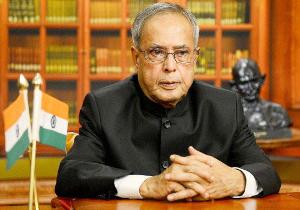 New Delhi, Jan 26: In an apparent reference to the Aam Admi Party, President Pranab Mukherjee on Saturday warned in his Republic Day-eve speech about the dangers of intemperate populism, saying "populist anarchy" cannot be a "substitute for governance".
New Delhi, Jan 26: In an apparent reference to the Aam Admi Party, President Pranab Mukherjee on Saturday warned in his Republic Day-eve speech about the dangers of intemperate populism, saying "populist anarchy" cannot be a "substitute for governance".
The President made unusually direct comments on AAP's politics and also stressed the need for a stable government after the forthcoming Lok Sabha election as he said a fractured mandate would be "catastrophic for the nation".
Mukherjee also warned political parties to either check corruption or be prepared to be voted out of office. He said popular aspirations were rising fast, and added: "Corruption is a cancer that erodes democracy, and weakens the foundations of our state. If Indians are enraged, it is because they are witnessing corruption and waste of national resources. If governments do not remove these flaws, voters will remove governments."
The President's speeches are usually a tepid affair replete with homilies, but this speech immediately attracted attention for the pointed observations and as it's written by the President with no input from the government unlike his address to the joint sitting of Parliament which is written by the central government.
'Govt is not a charity shop'
While his speech can be read to refer to populism in general, references to irresponsible populism seem aimed at AAP. He said: "Elections do not give any person the licence to flirt with illusions. Those who seek the trust of voters must promise only what is possible. Government is not a charity shop. Populist anarchy cannot be a substitute for governance."
Mukherjee went on to underline the possibility of public anger against institutions, saying "false promises lead to disillusionment, which gives birth to rage, and that rage has one legitimate target: those in power."
Mukherjee's comments on the significance of the 2014 election saw him pitching for a stable government not held to ransom by "capricious" regional parties. He added that voters have a responsibility to discharge and should not let the nation down.
"2014 is a precipice moment in our history. We must re-discover that sense of national purpose and patriotism, which lifts the nation above and across the abyss; and back on to the road of prosperity. Give the young jobs and they will raise the villages and cities to 21st century standards. Give them a chance and you will marvel at the India they can create," he said.
Saying this, he added, "This chance will not come if India does not get a stable government. This year, we will witness the 16th General Election to our Lok Sabha. A fractured government, hostage to whimsical opportunists, is always an unhappy eventuality. In 2014, it could be catastrophic. Each one of us is a voter; each one of us has a deep responsibility; we cannot let India down. It is time for introspection and action."
Mukerjee said, "Some cynics may scoff at our commitment to democracy but our democracy has never been betrayed by the people; its fault-lines, where they exist, are the handiwork of those who have made power a gateway to greed. We do feel angry, and rightly so, when we see democratic institutions being weakened by complacency and incompetence. If we hear sometimes an anthem of despair from the street, it is because people feel that a sacred trust is being violated."
Mukherjee said while political parties needed to be realistic about what they promise to people, they had to deliver development expeditiously. "This rage will abate only when governments deliver what they were elected to deliver: social and economic progress, not at a snail's pace, but with the speed of a racehorse," he said.
"The aspirational young Indian will not forgive a betrayal of her future. Those in office must eliminate the trust deficit between them and the people. Those in politics should understand that every election comes with a warning sign: perform, or perish."
"I am not a cynic because I know that democracy has this marvellous ability to self-correct. It is the physician that heals itself, and 2014 must become a year of healing after the fractured and contentious politics of the last few years," the President added.






Comments
Add new comment